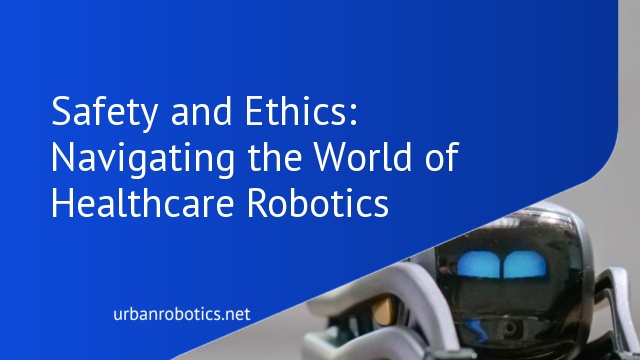We, as a society, are witnessing the rapid advancement of robotics in healthcare. This emerging field brings with it a myriad of ethical considerations and safety concerns that necessitate our attention and exploration. In this article, we aim to delve into the profound impact of robotics in healthcare, shed light on the ethical implications surrounding their usage, and emphasize the paramount importance of ensuring safety in the robotics industry.
The ethics of healthcare robotics is a critical aspect that demands careful examination. As robots increasingly assume roles in assisting with rehabilitation, providing care, and even engaging in socially assistive interactions, we must evaluate the ethical dimensions inherent in these applications. By doing so, we can make informed decisions and safeguard the well-being of those impacted by these robotic interventions.
Moreover, as automation and robotics become more prevalent in the health domain, it becomes imperative to scrutinize the ethics of introducing automated systems. Transparency in decision-making, particularly when machines are making critical choices, is an ethical imperative that cannot be overlooked. We must consider the ramifications for the doctor-patient relationship, privacy, data protection, and the wider ethical implications of integrating automated systems into medical workflows.
This article will provide a comprehensive understanding of the multifaceted ethical concerns in healthcare robotics. We will draw from a plethora of sources to shed light on the diverse dimensions of ethics in rehabilitation and assistance robotics. Additionally, we will explore the integration of bioethics and AI ethics, proposing an ethical framework tailored to care robots. By applying this framework, we can ethically assess the implications of care robots in the healthcare domain and offer practical recommendations for their responsible development and deployment.
Join us on this journey as we navigate the intricate landscape of safety and ethics in the evolving field of healthcare robotics.
Robotics in Rehabilitation and Assistance
The field of healthcare robotics has seen significant advancements in the areas of rehabilitation and assistance. Robots are being utilized in various capacities to aid healthcare professionals and improve patient outcomes. Rehabilitation robotics involves the use of robots to assist individuals in regaining physical function and mobility after injury or illness. These robots can provide targeted exercises, assist with balance training, and monitor progress.
Assistance robotics, on the other hand, focuses on providing support and care to individuals in need. Social robots are being developed to interact with patients and provide companionship, emotional support, and cognitive stimulation. These robots can assist with daily tasks, remind patients to take medication, and offer mental and emotional support for those who may be isolated or lonely.
In both rehabilitation and assistance robotics, ethical considerations are paramount. The integration of robots into healthcare settings raises questions about patient autonomy, privacy, and the potential for dehumanization. It is crucial to ensure that the use of robots in these contexts aligns with ethical principles and safeguards the well-being and rights of patients. Additionally, ongoing research and development are needed to address any potential risks or unintended consequences that may arise from the use of robotics in rehabilitation and assistance.
| Applications | Description |
|---|---|
| Robotic Surgery | Use of robots in surgical procedures for enhanced precision and minimally invasive techniques. |
| Physical Rehabilitation Systems | Robotic devices designed to assist patients in regaining physical function and mobility through targeted exercises and therapy. |
| Socially Assistive Robots | Robots designed to provide companionship, emotional support, and cognitive stimulation to individuals in need. |
| Training for Health and Care Workers | Simulation-based training using robots to enhance the skills and capabilities of healthcare professionals. |
As the field of healthcare robotics continues to advance, it is crucial that the ethical implications of their use in rehabilitation and assistance are carefully considered. By addressing these ethical concerns and ensuring the responsible integration of robots in healthcare settings, we can maximize the benefits of robotics while maintaining the highest standards of patient care and well-being.
Ethics and the Introduction of Automated Systems in the Health Domain
The introduction of automated systems in the health domain, including robotics, raises important ethical questions. As decisions are increasingly made by machines, transparency in the decision-making process becomes crucial. It is essential to consider the impact on the doctor-patient relationship, privacy, data protection, and the ethical implications of integrating automated systems into medical workflows.
One of the key ethical concerns in the introduction of automated systems is the potential loss of human agency and accountability. As machines take on decision-making roles, it is important to ensure that humans still have the ability to understand and challenge the decisions made by these systems. Transparency becomes a vital aspect in building trust between healthcare providers and patients.
Another ethical consideration is the potential bias and discrimination that can arise from automated systems. Algorithms used in healthcare may inadvertently perpetuate existing biases and inequalities, leading to disparities in access to care and treatment. It is crucial to develop and implement algorithms that are fair and unbiased, and to regularly assess and monitor these systems for potential biases.
The integration of automated systems also raises concerns about data privacy and security. As these systems collect and process vast amounts of sensitive patient data, it becomes imperative to ensure the protection of this information. Additionally, clear guidelines and regulations need to be in place to address the potential misuse or unauthorized access to this data.
Ethical Considerations in the Introduction of Automated Systems
When introducing automated systems in the health domain, it is important to approach the ethical considerations with care and deliberation. The potential benefits of automation in healthcare are significant, but it is crucial to implement these technologies in a way that upholds ethical principles and safeguards patient well-being.
Ethics and Rehabilitation and Assistance Robotics
Ethics plays a significant role in the field of rehabilitation and assistance robotics. As we explore the integration of advanced technologies in healthcare, it becomes essential to address the ethical concerns that arise in these areas. While some ethical considerations overlap with those seen in broader automated systems, there are also unique ethical challenges specific to working directly with patients in rehabilitation and assistance settings.
One of the key ethical concerns in rehabilitation robotics is the integration of consent. As these robots interact closely with patients, it is crucial to ensure that informed consent is obtained and respected throughout the treatment process. This involves not only obtaining initial consent but also providing patients with ongoing information about the robot’s capabilities, limitations, and potential risks. It is important to maintain a patient-centered approach and prioritize their autonomy and well-being.
Cybersecurity is another critical ethical consideration in the use of rehabilitation and assistance robots. As these robots handle sensitive patient data and play a role in delivering care, it is crucial to implement robust cybersecurity measures to protect patient privacy and prevent potential breaches. This involves safeguarding patient information, securing communication channels, and regularly updating and patching the robot’s software to address vulnerabilities.
Equity and social justice are also significant ethical dimensions to be considered in rehabilitation and assistance robotics. It is essential to ensure that these technologies are accessible and affordable for all individuals, regardless of their socioeconomic background. Moreover, the integration of these robots should not perpetuate disparities or inequalities in healthcare delivery. Ethical considerations related to resource allocation and prioritization of care should be carefully examined to ensure fairness and equal access to these innovative technologies.
Integrating Bio- and AI Ethics for Healthcare Robotics
When it comes to navigating the ethical landscape of healthcare robotics, we must integrate the principles of bioethics and AI ethics. This integration allows us to assess the ethical implications of care robots in the healthcare domain and provide practical recommendations for their ethical development and deployment.
By reconciling the perspectives of bioethics and AI ethics, we can create an ethical framework specifically tailored to care robots. This framework enables us to evaluate the ethical assessment of care robots, taking into account principles such as beneficence, non-maleficence, autonomy, justice, and explainability.
Applying this framework not only helps us to identify potential ethical issues, but also guides us in finding solutions and making informed decisions. It ensures that the development and deployment of care robots in healthcare align with ethical standards and values.
Moreover, this integrated approach allows us to navigate the complex trade-offs that arise in the ethical development of care robots. It enables us to strike a balance between providing efficient and effective healthcare services while safeguarding patient autonomy, privacy, and overall well-being. As we continue to explore the potential of care robots in healthcare, the integration of bioethics and AI ethics provides us with the necessary tools to navigate this rapidly evolving field in an ethically responsible manner.





